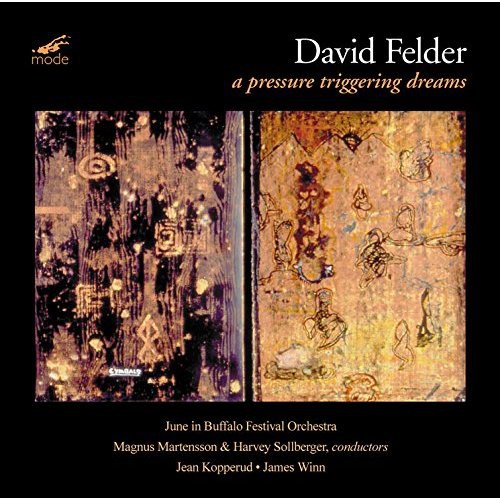- A Pressure Triggering Dreams
: Review
Coleccion Nocturna (1983) is the earliest of Felder's Neruda pieces recorded to date (there are many others, according to the notes, but most have yet to be issued on CD). It is a set of five "variations" on what Felder calls, "a wholly self-contained musical object" from man older piano work called Rocket Summer. The "theme" never seems to be presented clearly in its entirety, but what is clear is that diatonic fragments are heard trying to poke their way through five contrasting, modernistically surreal textures...
The Six Poems from Neruda's Alturas (1992-3) for orchestra is three movements based on six of the cycle of twelve poems in Neruda's searching cycle, Alturas de Macchu Picchu. This time, Felder assigns specific poems to each movement. I is a rugged, fearsome, explosion based upon poem 2 that seems to reflect the text's anger and anguish. II (based upon poems 1, 3, 4, and 5) is a landscape of desolate beauty filled with lush harmonic expanses -- there is a raucous climax about one-third of the way through, but for the most part this movement is thoughtful and has authentic depth. Here Felder truly seems to plunge "a turbulent and tender hand to the most secret organs of the earth", in the words of Neruda. Some of these "secret organs" seem to be references to Felder's earlier works, a procedure that Neruda himself employed in the construction of his cycle. Their presence here, if that's what they are, gives the movement a mysterious, dream-like atmosphere that at once invites and eludes further investigation. III returns to the rugged atmosphere of I and ends with a powerful cataclysm based on the rhythms of poem 9...
The final piece is A Pressure Triggering Dreams for orchestra and electronics (1997), written in response to a commission from the American Composers Orchestra, who asked for the inclusion of electronics. These take the form of computer-processed flute sounds, sampler keyboard (percussion), electric bass, and selectively amplified solo instruments--in other words they seek to augment the "real" orchestra rather than conflict with them. In the outer sections, long lines that are essentially monophonic in nature are surrounded by graffiti-like interferences producing an anxiety-ridden cacophony reminding me of Turnage (I guess these sections are the "pressure")...
Felder is a strong composer with impressive technique. Though its not immediately obvious, he can be heard as a neo-romantic who is not afraid of using an expanded and often extremely dissonant harmonic palette. I would like to see him find a balance between aggression and intensity; his taste for intransigent sonorities has a tendency to get in the way of what are fundamentally clearly conceived and arrestingly executed compositions. Performances and sonics are astonishing.
